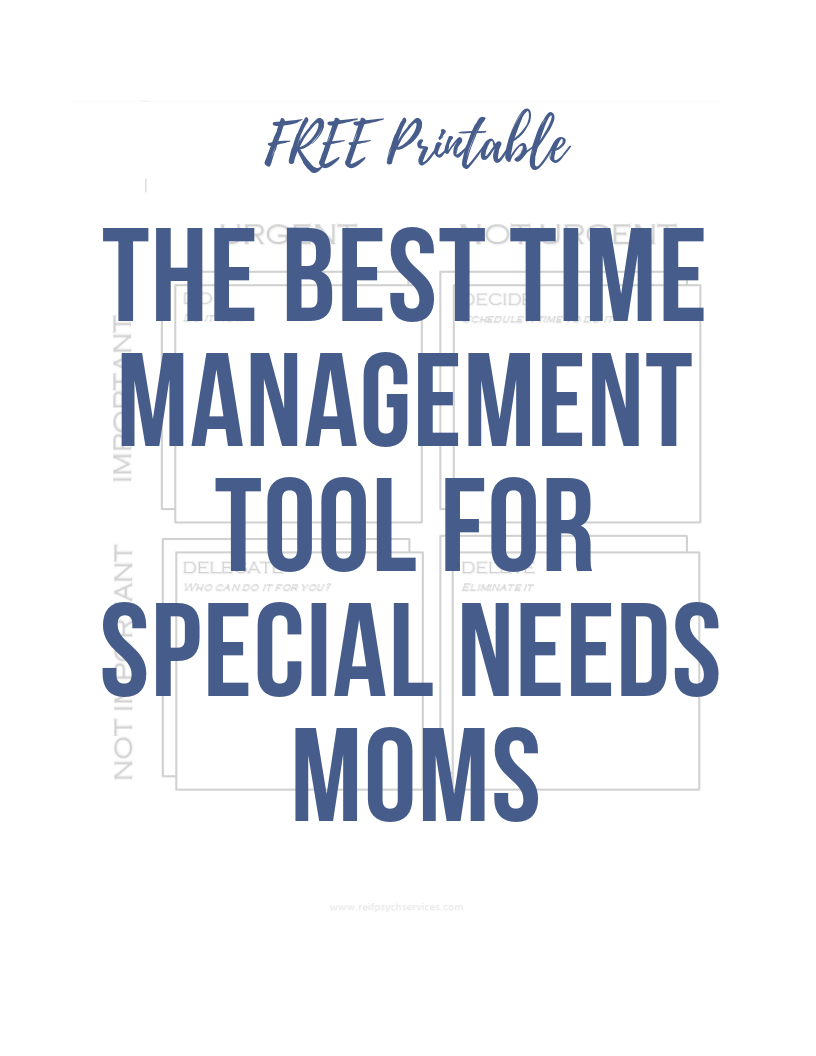Time. The one thing that all special needs moms need more of.
One thing never ceases to surprise me when I’m counseling mothers of kids with disabilities. No matter what their children’s challenges or diagnoses, the moms’ struggles and fears are usually the same. No matter their child’s disability, the moms almost always come to counseling for the same reason.
Moms of kids with disabilities come to therapy with me because they feel overwhelmed. They know they aren’t taking care of themselves, and genuinely want to do better. But they also feel guilty that they aren’t doing enough for their child, and they feel pulled in a million directions. They cry and lament:
‘I never have enough time to do it all!’
They’re right.
There is simply not enough time for one person to take care of themselves and to meet all the needs of their child who has disabilities.
If you don’t agree to accept this, then reading the rest of this post isn’t necessary.
You cannot personally do it all. Believe this is the foundation for making real, permanent change that will have a deep impact on your family. Not to mention it can do wonders for your mental health!

Why there’s never enough time
There’s never enough time because time is not a renewable resource. We all get the same 24 hours a day.
Your energy, on the other hand, can be constantly depleted, making you exhausted, prone to making mistakes, and frustrated. Or, your energy can be continually renewed, giving you strength and allowing you to be strong for others when you need to be.
I challenge the moms that I see for counseling to recognize the difference, and to ask for what it is that they really need and crave.
I encourage them to see that, if they make changes that will give them more energy, they will feel renewed and more capable.
They will be better prepared to use the 24 hours they have each day to accomplish what they truly need to do for their families.
And they will feel comfortable delegating the things that it isn’t critical that they personally do.
How to ‘find more time’
The secret to ‘finding more time’ is in deciding what things are actually worthy of your time, and in planning what to do with the things that aren’t.
I like to use a simple time management tool, called an Eisenhower box, with my clients, to help them put their to-do’s into one of four categories:
Urgent & Important
Not-urgent & Important
Urgent & Not-important
Not-urgent & Not-important
The name for the tool comes from US President Dwight D. Eisenhower, who said:
I have two kinds of problems, the urgent and the important. The urgent are not important, and the important are never urgent.
You’re welcome to download your own Eisenhower Box time management tool to fill in while reading along!

Here’s an outline of what my therapy clients’ Eisenhower boxes typically include:
Urgent & important
Things that you personally need to do, that need to get done immediately.
These are the things you’ve been putting off, maybe even dreading, because you know they will be uncomfortable. Or you’ve avoided them because you feel guilty about taking time for yourself.
The time for guilt is done.
Fully caring for your family means taking care of you. It also means planning for what your family will do when you can no longer care for them.
Not surprisingly, the two most common things that my clients put in this category are:
- Meet with lawyer to draft Last Will and Testament/Special Needs Trust.
- Schedule my personal annual physical/blood labs/mammogram/dentist appointment.
Be honest, you’d never let your child be late for their routine blood labs. Why is it OK for you to miss yours?
Not-urgent & Important
Things that you personally need to do, but that aren’t time-sensitive.
These are things that need to be done, that aren’t critical if you don’t do them today, but that become critical if you ignore them long term. These are the things you know you need to be doing more of, but that you put off because you put the needs of others ahead of your own.
The top two things that are identified by my counseling clients to go in this category are also not surprising:
- Commit to an exercise routine.
Sign up for a yoga class, start training for a road race. Don’t let one exercise session end without having the next two scheduled.
- Say yes to hobbies that ‘light you up’.
Most moms have a pastime that genuinely renews and energizes them, but that they have given up because there’s ‘no time for it’. When you recognize that it’s not time, but energy, that you need more of, you realize that it’s actually crucial for you to go to that pottery or film appreciation class. To act at the local theater, to schedule a time each week to work on your novel or blog. If it renews your energy, it is not a luxury. It is not even just critical self-care. It’s a necessary part of your time management plan.
Urgent & not-important
Things that need to get done, but that you don’t personally need to do.
This is a really tough one for moms of kids with disabilities. It is not easy to hand over control of something that you’ve been managing for a long time. It will be difficult to watch someone else struggle to learn to do something that comes naturally to you.
You will be tempted to say ‘oh, never mind, I’ll just take care of it.’
Don’t.
If you find that you’re having a difficult time delegating things, it can be helpful to take a step back from the immediate moment, and imagine how you’d like your life to be 1 or 5 or 10 years from now.
If you’d still like to be packing your teen-aged child’s lunch when they go to work 10 years from now, then by all means, keep doing it.
But if you imagine that 10 years from now they’ll be packing their own lunch, ask yourself how this change will happen, and when it should start. Why not now?
Accept that the difficulty of watching your child, your spouse, or even a professional grapple with something that you do quicker and ‘better’ is part of the process. Remove yourself from the situation, let them know where you’ll be if they have a question, and don’t watch them if that makes it easier for you.
If you still have a hard time letting go of tasks that you’ve always been responsible for, it may help to meet with a counselor, even just for a few sessions, to address why this is difficult and to help ease the transitions for you.
Typical things that my clients choose to delegate are:
- Things their kids really can be doing for themselves.
Getting dressed, preparing meals, scheduling activities.
- Things that it would be easier for a professional to do.
Hiring a dog walker rather than take an extended lunch break from work to go home and walk your dog each afternoon, having a landscaper to mow the lawn or blow the leaves, using online grocery store ordering
- Things that a spouse can do.
Attend IEP meetings and children’s doctor’s appointments (yes, they really can), preparing meals, budgeting/paying bills, picking up said online grocery store order.
Not-urgent & Not-important
Things that it’s not important that you personally do, and that it’s not really important if anyone does.
After delegating, choosing to delete things is usually the next most difficult task for the special needs moms I see for counseling.
The moms I see for therapy have often overextended themselves, but they just don’t see how they could give up on the PTA or the bake-sale or the carpool.
They know they don’t ‘have time’ to do it all, and so they feel stressed, but they also don’t see how they could eliminate a commitment they’ve made.
I usually encourage them to question if there’s something else they could give up that would alleviate stress and give them that all important energy boost, so that they’d actually enjoy the things they’ve committed to do.
As a personal example, a few months ago I donated about 80% of my wardrobe. I pared my closet down to around 30 items of clothing all in complementary colors…so, when you meet me and I’m wearing some combination of navy, green, and white, don’t say I didn’t warn you! I no longer have the familiar morning frustration of ‘I have so many clothes but nothing to wear’.
This simple, almost silly change gave me the feeling that I’d ‘saved’ so much time. Really what I’d done was eliminate the time and hassle spent making a choice that is truly neither urgent nor important. I know that if I reach into my closet and grab a top and pair of pants or a skirt, they will match. I leave the house looking put together and on-time, and this makes me feel confident and capable, which is a terrific way to start every morning!
Other things that the moms I work with choose to delete from their schedules are:
- Toxic friendships.
Related to this, I usually share in workshops the times I’ve worked with moms who were introverts, who had to learn to tell their extrovert friends that they were going to skip the ‘moms night out’ of dining and drinking and dancing because it was exhausting to them, but that they’d love to spend time going for a walk or a coffee and connecting one on one. Again, it’s about letting go of what exhausts you, and inviting more of what invigorates you into your life.
- Time wasters.
I’d guess that about 80% of the moms I work with on this skill choose to eliminate certain social media apps from their smart phones. Simply having to log onto a computer (and usually setting a timer) to engage on social media causes them to enjoy the experience more than if they’re aimlessly scrolling through Facebook or Pinterest countless times a day.
- Volunteer obligations that are no longer in-line with their values.
Or where more time is spent bickering than actually being of service. You know the ones I’m talking about.
- Social/recreational activities that their children are involved in that are no longer really meaningful for their child.
Often times the families I work with realize that they’re holding on to old habits and norms because they were once comforting and engaging for their child, but they are no longer serving that purpose. Let ‘em go.
When it’s not working
Inevitably, a mom will leave one box blank as she first works through her Eisenhower box. If you’ve been following along and you have a blank category, take a moment to consider what that really means for you.
Most commonly, it’s the delegate and delete categories that moms of special needs kids will have a hard time filling in. This is completely normal. You’re facing struggles that very few people understand, and I know that it’s hard to imagine giving over control of even one of your responsibilities to someone else.
Is how you’re living is truly sustainable? Could you keep going at this rate for the next year? How about 10 years from now? What will happen when you physically cannot keep doing everything you’re doing?
I know that it’s terrifying to think about that inevitable day. But I also know that you think about it so much more often than you’ll admit, maybe even to yourself.
If you’re ready to accept that you simply can’t keep holding it all together the way you have been for so long, I hope that this tool will be a first step for you to make real changes in your life.
Maybe you still feel stuck, or you fear that there’s no change you can make that will help. If that’ s you, then I hope you’ll spend some time with a professional counselor to help you identify what it is that truly needs to change. Because i know from years of helping moms just like you that it IS possible to find balance, connection, and wellness.












